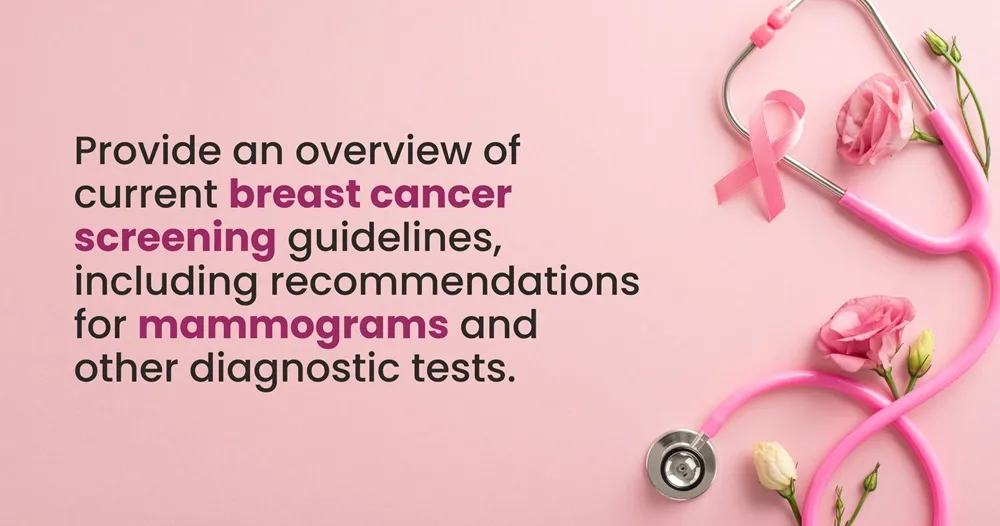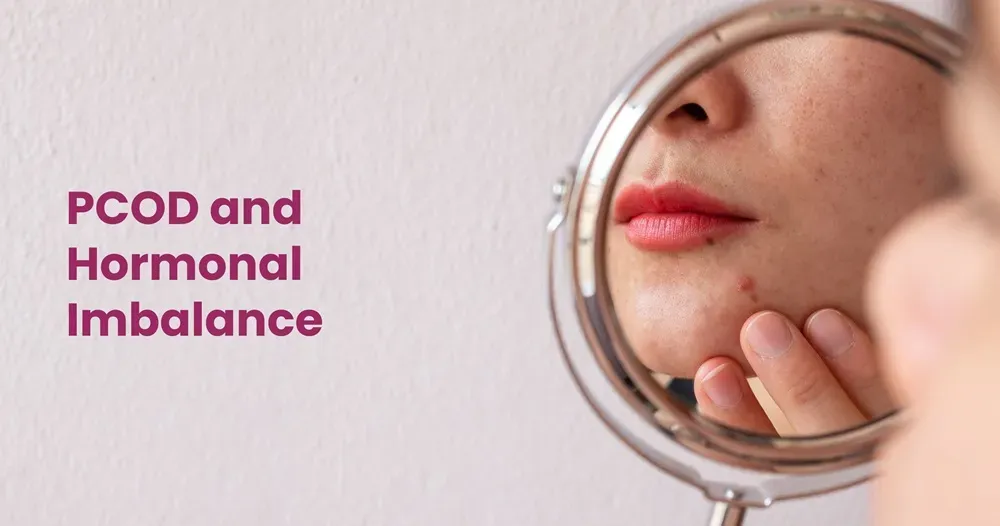Navigating Breast Cancer Screening: Current Guidelines and Insights
Oct 26, 2023

Breast cancer is a formidable health concern worldwide, affecting countless lives. Early detection and timely intervention can significantly improve the prognosis and quality of life for those diagnosed with breast cancer. In this blog, we will provide a comprehensive overview of current breast cancer screening guidelines, focusing on recommendations for mammograms and other diagnostic tests.
Understanding Breast Cancer: An Intricate Disease
Breast cancer is a malignant condition that occurs due to the uncontrolled growth of abnormal cells in the breast tissue. It can affect both men and women, although it is more common in the latter. Breast cancer typically begins in the milk ducts or lobules and can, over time, invade surrounding tissues and potentially spread to other parts of the body.
Symptoms of breast cancer may include breast lumps, changes in breast appearance, nipple discharge, and skin abnormalities. Timely diagnosis and appropriate medical intervention are essential to improve survival rates and overall well-being.
Causes of Breast Cancer
Breast cancer is an ailment with multifactorial causes. Understanding these causes is crucial for developing effective screening and prevention strategies.
- Genetic Mutations: Inherited genetic mutations, such as BRCA1 and BRCA2, prominently intensify the risk of breast cancer.
- Hormonal Factors: Hormonal influences, like early menstruation, late menopause, and hormone replacement therapy, can contribute to breast cancer
- Age: The risk of breast cancer increases with age, with most cases diagnosed in postmenopausal women.
- Gender: While breast cancer is predominantly associated with women, it can also occur in men, though it's much less common.
While exploring the complex causes of breast cancer sheds light on its origins, understanding the associated risk factors is crucial for assessing personal vulnerability and guiding informed preventive measures.
Risk Factors for Breast Cancer
Numerous risk factors can influence an individual's likelihood of developing breast cancer. Recognizing these risk factors is essential for informed healthcare decisions.
- Family History: A family history of breast cancer, particularly among first-degree relatives, can raise the risk.
- Hormone Replacement Therapy: Long-term use of hormone replacement therapy for menopause symptoms can increase the risk.
- Dense Breast Tissue: Women with dense breast tissue have a higher risk of breast cancer, and it can make mammogram interpretation more challenging.
- Personal History: A prior breast cancer diagnosis intensifies the risk of reappearance.
- Radiation Exposure: High doses of radiation, especially during a young age, can elevate the risk of breast cancer.
Current Breast Cancer Screening Guidelines
Breast Cancer screening aims to detect the disease at its earliest. Here’s on overview of current screening guidelines:
- Mammograms
A mammogram is a specialized X-ray of the breast used for early breast cancer detection. For women at average risk, regular mammograms are recommended starting at age 40. Mammograms should be performed annually or biennially based on individual risk and preferences. Women with a family history of breast Cancer may start mammograms earlier or undergo additional screening, such as breast MRI.
should be performed annually or biennially based on individual risk and preferences. Women with a family history of breast Cancer may start mammograms earlier or undergo additional screening, such as breast MRI.
a mammogram typically takes about 20 to 30 minutes to complete and can be performed at various healthcare facilities, including hospitals, imaging centers, and clinics with specialized mammography equipment.
- Clinical Breast Exams
Clinical breast exams (CBE) are physical examinations of the breasts conducted by primary care physicians, gynaecologists, or breast specialists. The duration of a CBE typically ranges from 5 to 15 minutes. It's on essential part of breast cancer screening, complementing mammograms and self-exams to detect any abnormalities or changes in the breast tissue. CBEs are typically recommended an an annual basis for women aged 20 and older, though individual recommendations may vary based an age and risk.
- Breast Self-Exams
To perform a breast self-exam, use the pads of your three middle fingers to gently feel for any lumps or abnormalities in circular motion, covering the entire breast and surrounding areas. Perform the exam in the shower or while lying down to ensure thorough coverage and report any unusual findings to your healthcare provider. While breast self-exams are no longer universally recommended, they are still encouraged by those who find them helpful in recognizing any changes.
- Additional Imaging
In some cases, additional imaging methods, such as breast ultrasound or Magnetic Resonance Imaging (MRI), may be recommended based on individual risk factors, personal history, or breast density.
When to Consult a Doctor?
Breast Cancer symptoms are not always present, and early breast cancer detection relies on regular screening. But certain signs should promt immediate consultation with a healthcare professional:
- Areast Lumps: The discovery of a new, painless lump in the breast or underarm should be investigated.
- Changes in Breast appearance: Any unexplained changes in the size, shape, or appearance of the breast should be evaluated.
- Nipple Discharge: Spontaneous nipple discharge, especially if it's bloody, requires medical attention.
- Breast Pain: While breast pain is often non-cancerous, persistent or severe pain should be discussed with a healthcare provider.
- Skin Changes: Redness, dimpling, or other skin changes on the breast can be a sign of underlying issues and should be examined.
Summing Up!
Breast Cancer screening is a vital component of maintaining overall health and well-being. Understanding the current guidelines, causes, risk factors, and the right time to seek medical advice can empower individuals to take charge of their breast health. Early breast cancer detection remains one of the most effective ways to improve outcomes and ensure a healthy and fulfilling life.
At Apollo Diagnostics, we’re committed to your well-being. Our state-of-the-art facilities offer comprehensive breast cancer screening, including mammograms and other advanced diagnostic tests. With a skilled team and a patient-focused approach, we provide a comfortable and confidential environment for your screening. Visit the nearest Apollo Diagnostic Center today!
FAQs
1. At what age should I start breast cancer screening?
Breast cancer screening guidelines recommend that women with average risk start mammograms at age 40, but individual decisions should consider family history and risk facors. It's essential to discuss this with your healthcare provider.
2. Are mammograms the only screening method available?
No, in addition to mammograms, clinical breast exams, breast self-exams, and other imaging modalities like breast ultrasound and MRI may be used as part of a comprehensive screening approach.
3. Can men get breast cancer?
Yes, men can develop breast cancer, although it is rare. Men should be aware of the symptoms and consult a healthcare provider if they notice any concerning changes in their breast tissue.
Related Blog Post
- 5 Causes of Infertility
- 5 Important Medical Tests for Women Above 30
- HPV Detection and Genotyping for Cervical Cancer Detection
- Importance of Genetic Counselling in Genetic Testing
- A Comprehensive Guide for Women’s Bone Health Through Different Stages of Life
- Strong Bones, Strong Women: Understanding the Link between Vitamin D and Bone Health
Blog Categories
- Child Health
- Mens Health
- Women's Health
- Mental Health
- Health Myths & Facts
- Fitness
- Nutrition/Recipes
- Remedies
- Weight Management
- Stress Management
- Health Supplements
- Addiction Management
- Disease Management
- Allergy
- Anemia
- Arthritis
- Asthma
- Autoimmune Diseases
- Blood Pressure
- Cancer
- Deficiencies
- Dengue/Malaria/Chikungunya
- Diabetes
- Eye Problems
- Heart Diseases
- Hepatitis
- HIV/AIDS/STD
- Hormonal Imbalance
- Infection/Flu/Viral
- Kidney
- Liver
- Menstrual Problems
- Pregnancy
- Skin & Hair Problems
- Stomach Ailments
- Thyroid
- Others
- Health Checkups
- Diagnostics/Pathology
- Lifestyle & Wellness
- Covid
- Medical Tests
- Cholesterol
- Health Tips
- Parent Care/Old Age
- Lungs
- Food Intolerance








